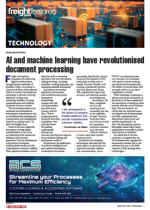Over the past year, the freight industry has experienced a groundbreaking shift, with the increased adoption of artificial intelligence (AI) and machine learning (ML) for predictive analytics. These cutting-edge technologies are transforming how companies forecast demand, optimise routes and manage inventory, heralding a new era of efficiency and precision in logistics, according to Ridwaan Mohammed, general manager at Advanced Customs Solutions (ACS).“As the industry embraces these advancements, businesses are poised to reap significant benefits,” he said. “Another key development is the growing use of blockchain technology to enhance transparency and security in trade transactions. Blockchain provides an immutable ledger that ensures all parties in a supply chain can trust the accuracy of data, reducing the risk of fraud and improving accountability.”According to Mohammed, technology is streamlining operations, enhancing transparency and improving decision-making processes. “With the integration of these new systems, companies can now automate complex tasks, reduce manual errors and accelerate shipment processing times. This shift towards digitalisation is allowing for more accurate tracking of goods, real-time updates and seamless communication across supply chains. In addition, accounting software designed specifically for the logistics sector is enabling businesses to manage finances more effectively, ensuring compliance with regulations and reducing the risk of costly errors.”Mohammed said companies in the freight sector were leveraging technology in several ways to improve efficiency and reduce costs. “The ACS freight system, for example, is automating documentation processes, significantly reducing the time and resources needed to complete regulatory requirements. Additionally, the Internet of Things (IoT) devices are being deployed to monitor cargo conditions in real-time, helping to prevent losses and optimise transport routes. The integration of these technologies not only reduces operational costs but also enhances customer satisfaction by ensuring timely and accurate deliveries.“AI is improving predictive maintenance and optimising supply chain logistics, leading to reduced downtime and more efficient operations,” he said. A notable example involves a freight company that integrated IoT devices into its f leet, allowing for real-time tracking of cargo conditions. This not only reduced the risk of damage during transit but also enabled the company to optimise routes based on real-time data, resulting in a 15% reduction in fuel costs. LV

